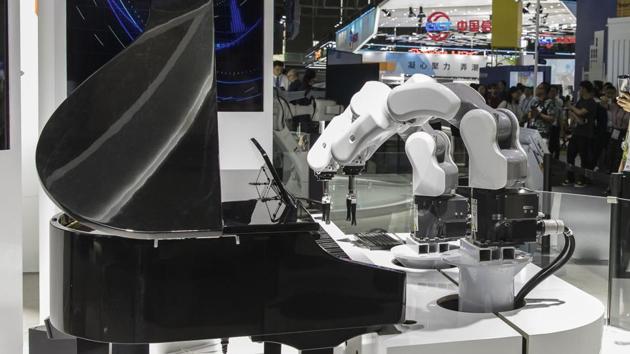For the argument (by Bhagyashree Prabhutendolkar, class 10, Thakur Vidya Mandir High School, Kandivli (East), Mumbai)

While I hear the assistant Alexa or Google adapted to man reigning on fragments of our lives, the day when robots and artificial intelligence (IA) will ensure and reign over humans do not seem too far in the future.
Without a doubt, the growing domination of robots in workplaces will certainly increase unemployment levels in the country. In addition, dependence on robots for the smallest tasks will make the human brain weak.
In this world, where young people are fighting and working to be employed for their daily bread, robots could worsen things.
Imagine that robots converse with humans, in which the person waste time trying to make the robot understand what he really expects from this technology.
Robots need great capital, maintenance, energy, etc., while humans do not.
If the robots finally do all the work and the man seated and watched them, it would lead to health risks and make man in slow motion.
If an AI -based diagnosis does not detect the patient’s real disease, which would be held responsible for this – the programmer or artificial intelligence itself? Humans agree to work on a much lower income compared to the heavy costs necessary to hire a robot that will affect the benefits of a business.
India has nearly 18 million people trapped in the main issue of unemployment.
So why do we need robots when humans are ready to work and contribute to society?
Against the argument (by Varad Khedekar, class 10, Thakur Vidya Mandir High School, Kandivli (East), Mumbai)
It is often said that necessity is the mother of invention. To make life practical and make progress, we, humans, have worked rigorously in all areas. Robots and artificial intelligence are some of the current subjects of research and development. But a lot of capital is invested to make or buy robots and they must be maintained and provide power for their race. Their software and equipment costs are too high.
On the other hand, human resources are quite affordable and reliable. Robots have no sense of emotions or consciousness and have no decision -making skills to manage difficult situations. Automation can only be carried out when robots are fed with humans’ programs. According to a UK report, robots and artificial intelligence will create more jobs than they will take in the years to come. Robots do not have the capacity to create or imagine things like ultimately, they are machines under human control.
Humans are those who develop new ideas and have the potential to transform imagination into reality. Jobs in health, scientific and technical or research services, hospitality, etc. cannot be completely taken up by robots. With the use of artificial intelligence, robots can interpret and learn things, but can never beat the ultimate human mind. Robots eliminate dangerous jobs for humans because they can work in dangerous environments. The AI would have a low error rate and would have incredible precision, precision and speed, which leads to effective and rapid work for humans. In the future, we can see a robotic world, but the main key will always be in human hands.


